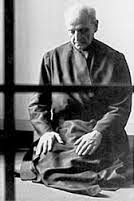From the Hermitage
... the light came into the world,
but people preferred darkness to light,
because their works were evil.
For everyone who does wicked things hates the light
and does not come toward the light,
so that his works might not be exposed.
But whoever lives the truth comes to the light,
so that his works may be clearly seen as done in God.
because their works were evil.
For everyone who does wicked things hates the light
and does not come toward the light,
so that his works might not be exposed.
But whoever lives the truth comes to the light,
so that his works may be clearly seen as done in God.
Dear Friends,
Our faith ancestors, the Apostles and their disciples, continued to live on in what they had learned from Jesus. St. John speaks of this enthusiasm, this belief, this dedication, as "living in the light." For the advocates of Jesus' mission, also the Father's mission, simply attesting to the light was only a part of what it meant to be a follower of Jesus.
Living in the light is no different today! In the reading from Acts of the Apostles today, St. Paul recalls the experience of those dedicated to the Risen Lord Jesus. Although placed in jail by the High Priest and his friends, miraculously the bonds of jail were released for them by an angel. Rather than run away the freed company returned to teach and preach. They are examples of courage. Let me quote a lawyer from Omaha, Nebraska: "courage is fear that has said its prayers!"
Today there are many would be followers of Jesus who are confined in jails of different kinds. Indeed some are jailed because of their support for social justice, their commitment to those seeking to be the individuals God wants them to be. There are others who find it very difficult, if not almost impossible, to surrender to God's will for us.
Looking at our own lives and how we are living or at least wishing we were living the life of the light, some are confronted by the satisfaction derived from the sins that are so difficult to toss away. Self-knowledge requires much courage, truly "the fear that has said its prayers."
As we move from the torture and death of Calvary Hill, we who have been baptized into the light are called to confront those fears that our society and our passions that have more control over us than the light. To live and to proclaim "I am a follower of Jesus Christ" requires genuine courage. I seek to live as Jesus' mission demands of me." These are proclamations that require much prayer and conviction. This light is a way of life that can only succeed with knowing what life God wants of me.
So, living with the light, living with the Lord Jesus: what does it ask today?






